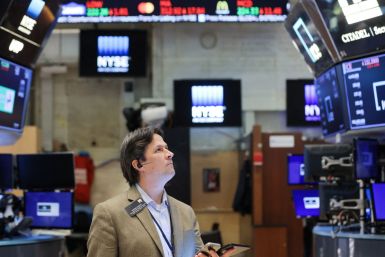Aptamil maker Danone SA has stepped up shipments of infant formula from Europe to address a shortage in the United States, according to U.S customs data and an analysis of ocean cargo data by shipping consultancy Ocean Audit for Reuters.
China's crude oil imports from top supplier Saudi Arabia soared 38% in April from a year earlier, hitting the highest monthly volume since May 2020, according to Reuters' calculations based on official Chinese customs data.
Asian shares jumped on Friday after China cut a key lending benchmark to support a slowing economy, but a gauge of global equities remained set for its longest weekly losing streak on record amid investor worries about sluggish growth.
Asian shares jumped in early trade on Friday after China cut a key lending benchmark to support a slowing economy, but a gauge of global equities remained set for its longest weekly losing streak on record amid investor worries about sluggish growth.
Shares rebounded on Friday after China cut a key lending benchmark to support its economy, though a global equities gauge remained set for its longest weekly losing streak on record amid investor worries about slowing growth and high inflation.
An earlier rally in global stocks fizzled and the dollar strengthened on Friday as investor unease about Federal Reserve policy tightening to clamp down on inflation kindled fears of a slowdown and put risk-off sentiment back in the ascendancy.
The U.S. dollar headed for its worst week since early February against major peers on Friday, weighed down by a retreat in Treasury yields and fatigue after the currency's breathless 10%, 14-week surge.
The U.S. dollar rose against the euro on Friday, as investor unease about the potential economic fallout from Federal Reserve's efforts to squash inflation bubbled to the surface, souring risk sentiment on Wall Street.
The U.S. dollar recouped some of its losses against the euro on Friday, but remained set for its worst weekly performance against the common currency since early February as investors questioned whether the greenback's month-long rally was done.
Indonesia will reimpose a domestic sales requirement on palm oil, the government said on Friday, a day after the world's biggest producer of the key edible oil reversed a ban on its export.
Indonesia will impose a domestic sales requirement for palm oil, to shore up local supplies of cooking oil when the world's biggest producer of the edible oil reopens exports next week, the country's economics minister said on Friday.
Oil prices were largely steady on Friday and on course for little change on the week as a planned European ban on Russian oil balanced out investor concerns about weakening economic growth hitting demand.
Oil prices edged up on Friday as a planned European Union ban on Russian oil and easing of COVID-19 lockdowns in China countered concerns that slowing economic growth will hurt demand.
Oil prices fell on Friday as investors worried that weakening global economic growth and tighter central bank monetary policy could curb a recovery in fuel demand.
Oil prices settled slightly higher on Friday as a planned European Union ban on Russian oil and easing of COVID-19 lockdowns in China countered concerns that slowing economic growth will hurt demand.
The U.S. Federal Reserve will lift interest rates higher by the end of this year than anticipated just a month ago, keeping alive already-significant risks of a recession, a Reuters poll of economists found.
Japan's core consumer inflation in April rose above the central bank's 2% target, hitting a more than seven-year high as increases in energy and commodity costs are causing broader price hikes that are pressuring households.
Japan's core consumer inflation in April exceeded a central bank target of 2% for the first time in seven years, but only thanks to rising import costs, not the strong domestic demand that the central bank has been trying to kindle.
El Salvador lacks credibility in managing its finances and would benefit from a program with the International Monetary Fund, an official at ratings agency Moody's said on Thursday.
Emerging economies will face a "tough terrain" for the next few quarters due to the Russia-Ukraine war, Atsi Sheth, global head of strategy and research for Moody's Investors Service, said on Thursday.
British fund manager Ruffer Investment Management is in talks with institutional investors to expand a recently launched U.S.
As the European Central Bank races towards the stimulus exit to tame record-high inflation, angst about whether it can contain stress in weaker economies is creeping back into corners of bond markets.
The S&P 500 ended lower after a volatile session on Thursday, with Cisco Systems slumping after giving a dismal outlook, while investors fretted about inflation and rising interest rates.
The S&P 500 and the Dow fell for the second straight day on Thursday as Cisco Systems slumped following a dismal outlook, while a rebound in megacap growth stocks boosted the battered Nasdaq.
Wall Street was mixed on Thursday, with Cisco Systems slumping following a dismal outlook, while Nvidia and other megacap growth stocks rebounded after recent losses.
As more people resume travel and plan vacations, retailers and consumer product companies including U.S.
Thailand has no need to raise interest rates following the Federal Reserve's hikes in U.S.
Sri Lanka's central bank governor said on Thursday he will stay on as head of the bank given an improvement in political stability in the midst of an economic crisis, and he would not step down as he had earlier said he would.
A new study by the central bank to the world's central banks, the Bank of International Settlements (BIS), has called for urgent action to tackle rising wealth inequality, warning the problem was feeding a dangerous loop of recessions and poverty.
El Salvador's big bet on bitcoin, which the Central American nation has been buying since September, has soured in recent weeks as a cryptocurrency rout shaved over a third of the value of the government's holdings, Reuters calculations show.






































